贝多芬简介(英文版)
Ludwig van Beethoven 贝多芬生平简介 英语PPT

The main works
• S ym phony N o.5, O p.67 the fa te (命运)
• S ona ta N o.14 c-sha rp M inor, "Q ua si
una fa nta sia" ("M oonlight") (月光奏鸣曲) • S ym phony N o.9, O p.125 "C hora l" (欢乐颂) • S y mphony N o.3, Op. 55 "Eroica" (英雄)
• Setbacks(挫折): • 1 Middle-aged deaf • 2 For the night to play the piano, which has the influence on neighborhood, thus often moving • 3 His relatives treat him badly • 5 The sick made him often see a doctor, so that he was tortured to focus on creating
Ludwig van Beethoven
1770.12.16—1827.03.26
Introduction
• A German composer, pianist, conductor. One representative of Vienna classical music. He has composed 9 Symphonies, the first number 35 Piano Sonatas , 10 Violin Sonatas, 16 first string quartet four, 1 operas, 2 masses, 1 cantatas and 3 Cantata, in addition to a large number of chamber music, songs and dances. These works have far-reaching influence on the development of music, thus being known as Le saint.
贝多芬的英文简介

贝多芬的英文简介贝多芬的英文简介贝多芬,德国杰出的音乐家,维也纳古典乐派代表人物之一,世界音乐史上最伟大的作曲家之一。
被尊称为“乐圣”和“交响乐之王”。
下面是店铺给大家整理的贝多芬的英文简介,供大家参阅!贝多芬简介Ludwig van Beethoven (Ludwig van Beethoven) December 16, 1770 - March 26, 1827, at the age of 57 years, Germany's outstanding musicians, Vienna, one of the representatives of classical music, the history of world music One of the greatest composers. His works on the development of world music has a very far-reaching impact, so be known as "music" and "the king of the symphony."Beethoven's main works take the top nine symphonies. The fifth symphony "Fate", the sixth symphony in F major, "Pastoral", the seventh symphony of A major, the ninth symphony of d minor " Chorus "(" Ode to the Song "the main melody), Overture" Love Gormon "," Leonora ", rose c minor fourteenth piano sonata" moonlight ", F major fifth Violin sonata" spring ", F major The second romantic song.His nine symphonies play a decisive role in the development of world music, and his late works are romantic. His "moonlight" in the form of legends appeared in the textbooks of the sixth grade of the primary school language (on "26. Moonlight").Beethoven's position in the history of music is extremely prominent, he is not only a master of classical style, but also a pioneer of romantic style. As a master of music, Beethoven is also a considerable degree of attention to the art of music, he is a pioneer in the creation of German art songs, life has pianoaccompaniment of more than sixty songs, his artistic songs with a very rich expression of the way and form To show, express the feelings of all mankind. In the field of art songs made remarkable achievements. From 1896 began to feel the increasingly weak hearing, 1813 - 1817 Beethoven's creation is also a temporary decline; 1818 - 1827 Beethoven left ear deafness, health deterioration, forty-six Beethoven hearing has been completely lost.贝多芬个人经历Childhood experienceDecember 16, 1770, Beethoven was born in Bonn, Germany, poor families. The father is the mediocre choir of the house choir of the tenor, the mother is a much tortured palace chef's daughter. His grandfather was the chief of the Bonn Palace Orchestra. In his father's strict training, Beethoven revealed the music of talent, but Beethoven is often beaten by his father.Beethoven 4 years old will play the harpsichord, and get the reputation of the music prodigy; at the age of 5 suffering from otitis media; 8 years old began to perform on stage; 10 years old, he was the most famous music education in Prussia Beethoven's 11-year-old first "Piano Variations" at the age of 12; 12 years old by Nie Fei's recommendation, to Walterstein's palace band as organist assistant, then Beethoven's "music servant" The career began. 13-year-old Beethoven participated in the court band as an organist and an old pianist.Study experienceIn 1781 Beethoven followed the band conductor Kristian Gott Roberto Nefer learning piano and composer, Beethoven also with Franz Anton Reese learn violin, under the guidance of the new teacher makes Beethoven began to form their ownunique style of.In 1787 to Vienna, began to follow Mozart, Haydn and others to learn composition, at the beginning, Mozart wanted to see his ability to let him play music, Mozart heard his playing after the prediction of one day Beethoven will shake the world The Beethoven arrived in Vienna shortly after the death of his mother, he had to immediately back to Bonn. As a result of the family's drag, until the fall of 1792 his father died, he came to Vienna for the second time, but then Mozart is no longer alive.Beethoven also followed Schenck, Albrecht Borg and Salieri and others to learn. He was in Bonn through contacts with the intellectuals of Browning, access to many well-known professors, writers and musicians, and from them, by the "hurricane" trend of influence. His democratic ideology had matured in the years before the French Revolution, but grew rapidly in the revolutionary era. Beethoven during this period to create "prelude to F", two preludes and so on.Painful experienceBeethoven began to write the first symphony at the age of thirty, from 1796 began to feel the hearing is weakening, his love of life and the pursuit of art to overcome his personal pain and despair, suffering into He created the source of strength, he strangled the fate of the throat.He still painstakingly created "hero symphony"; "Hero Symphony" marks the Beethoven's state of mind turn, but also marks his creation of "heroic age" began.Beethoven's later stage in Vienna, as Europe is experiencing a period of severe political reaction, that is, Mettner's reactionary rule is particularly rampant.1818 - 1817 Beethoven's creation is also temporarily showinga decline; 1818 to 1827 Beethoven in the ears deaf, the deterioration of health, the spirit of torture, still with the giant perseverance created the "Ninth Symphony" Summed up his glorious, epic life, and show the good wishes of mankind.In 1823, Beethoven completed his last masterpiece in his life - the Ninth Symphony.In his later yearsForty-six-year-old Beethoven heard completely lost, still adhere to the music creation. In his later years, Beethoven created the last few string quartets.In 1826, Beethoven was unable to complete due to serious illness.In December 1826, Beethoven suffered from severe colds leading to pulmonary edema.March 26, 1827, Beethoven died in Vienna.On the day of his burial, all the schools were closed for mourning, twenty thousand people attended the funeral of Beethoven, and his tombstone was engraved with the inscription of the Austrian poet Greer Barty: "... when you stand in front of his coffin , Is not shy, but a kind of lofty feelings; we only have such a talent for him can say: he completed the great cause ... ... "贝多芬创作风格Beethoven's works are known for their heroic, dramatic and thoughtfulness. As he himself said: "music should make the human spirit burst out of the spark." For example, his most famous "fifth" fate "Symphony" in the "fate movement" describes the brutal fate of the struggle, and ultimately win The faith.He created a total of nine symphonies, one of the most well-known for the "third" hero "symphony", "fifth" fate "symphony","sixth" pastoral "symphony" and "ninth" chorus "symphony".His piano music works are known for his passion for boldness and contrast. Piano sonata plays an important role in his work, not only reflects the evolution of his personal music creation style, but also indicates the piano music from classicalism into the romantic process.Starting from the third movement of his second sonata, Beethoven replaced the small steps with Haydn and Mozart with a scherzo. Since then the structure of the sonata is: the first movement, the drama of conflict; the second movement, lyrical or contemplative adaption, used to express the complex inner emotional ups and downs; third movement, small step, Beethoven replaced with scherzo ; The fourth movement, rondo, warm, festive characteristics.The most famous of the sonata works is "warm", "sad", "moonlight", "dawn" and "storm" five.In Beethoven's later years, he also wrote six string quartets, which represent the "quartet of the B-Major". In the creation of vocal works, there are vocal divertimento "to the distant lover", Cantata "solemn mass" and other important works. One of his most important operas is "Ferdinand".Beethoven's work by the eighteenth century Enlightenment and the German Hurricane sudden movement of the impact of distinct personality, than the predecessors have made great progress. In music performance, he almost involved all the music genre at that time; greatly improved the performance of the piano, so that the symphonic drama effect; also make the symphony become a direct reflection of social change in the form of important music.Beethoven set the culmination of classical music, whileopening up the romantic music of the road, the development of world music has a pivotal role, known as the "music Saint".Beethoven's creative idea is broad, magnificent image, deep feelings, contrast, which makes him emphasis on the use and expansion of the sonata style; at the same time because of the rich and varied image, the use of the works in the sonata and have their own characteristics.Beethoven's other orchestral works include "Violin Concerto", five piano concertoes, two preludes, piano bands, chorus fantasy, two violin tunes and band romance.His music, from that full of sunshine and youthful vitality behind the joy, often still can feel a pain, depression and sadness. Only Beethoven, he is not only angry against the feudal system of autocracy, and with his music called for people to fight for freedom and happiness.Beethoven in addition to absorb the traditional classical sonata structure reasonable ingredients, but also in their own creation to be greater innovation:The use of the primerRead the works of classical masters, from Haydn, Mozart to Crowe, Klemen Mentor, etc., their works are often straight to the point, straightforward meaning, the introductory part is often omitted. Only Beethoven, he gives the primer a new meaning, just like a concert prelude or opera prelude, the primer is often as a preface or a relatively independent part of the music content is briefly summarized, and implied, inspired, transition, description and so on. Such as "warm" third movement 1-19 section of the introduction, "Sorrow" the first movement of the 1-10 section of the introduction, the rise of the fourth anniversary of the V verse Sonata piano sonatas 1-4 section of theintroduction and so on.The presentation department is not repeatedWe know that in the analysis of classical sonata presentation department, often will find the first repeated mark, the first repeated before the mark for all the presentation. But in the "warm", Beethoven has this repeated mark omitted, it can not be said that Beethoven's "classical frame" betrayal and innovation. Of course, the presentation of the song is not repeated mainly music content development results.The part of the connection, the expansion and the end of the full independenceBeethoven's work, "start" is only relatively unfolded, often "symbolic", and "connection" and "end" is a mere identity in the work, there is no independence Meaning, is transferred from the tone or tone, to "bridge" in the identity of the work of the secondary position; some simply put the expansion of the Department. Beethoven has given the expansion, the connection and the end of the new meaning, in space and art height, is predecessors can not. There is 71 steps (65-135) in the first movement of the "passion", the connection is 20 (16-35) and the end is 15 (51-65). While the third movement of the expansion of the Department has 94 knots as much as (118-211), the connection is accounted for 40 sections of the giant (36-75); and in this section to give the connection part of a certain degree of independence and more Strong melodic tendency.The endThe unprecedented development of the end is not only in the length of the elongation, and more valuable is that Beethoven still give the end of the relative independence of the meaning. "Passion" of the first movement ending 59 (that is 204-262), the third movement ending 54 (that is, 308-361). He often refers to the main part of the vice part of the music material, the tail for the mixed development, and to the end of the more specific Ad Ha. ("Warmth" the first part of the first part of the movement section 239), presto "passion" the third part of the third part of the movement section 308), as well as other terms such as piuallegro speed or intensity, so that the end becomes a relatively complete four-phrase structure of independence paragraph.。
贝多芬英文简介
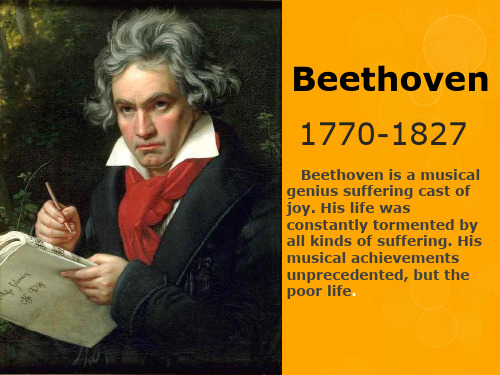
Famous words
I want to clutch the throat of destiny, it does not make me complete submission.
我要扼住命运的咽喉,它不能使我完全屈服
Music is the trip of the soul ,there’s nothing more pure than music.
Beethoven
1770-1827
Beethoven is a musical genius suffering cast of joy. His life was constantly tormented by all kinds of suffering. His musical achievements unprecedented, but the poor life.
音乐是心灵的旅程,没有什么比音乐更加纯 净
Beethoven’s simple introduction
He was born in the German on the 16th of December 1770, a civilian family , have been followed his father to learn music .When he was eight years old ,he gave his first public piano performance. 1792 to Vienna for further study in art progress. He began to lose his hearing in 1801 and was deaf by 1819.
Thanks for watching
贝多芬LudwigvanBeethoven中英文简介
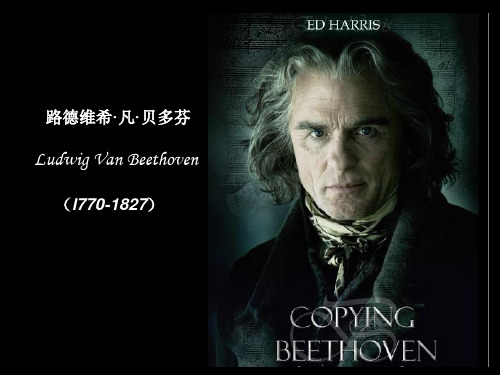
路德维希·凡·贝多芬Ludwig Van Beethoven
close our eyes hold our breath listen carefully to the Fate Symphony
(命运交响曲)
Moonlight Sonata
(月光奏鸣曲)
路德维希·凡·贝多芬Ludwig Van Beethoven
The Creatures of Prometheus Op.43 普罗米修ory
• One autumn, Beethoven went to inspect, to a small town in the Rhine.One night in the quiet road walking, heard on and off the piano from the house, this is his song, which is a 16-year-old girl, her face is very handsome, but blind, Beethoven was impressed by the girl, decided toa play for her, that is the famous "Clair de Lune".
第四钢琴协奏曲 1805-1806 G大调
Pinao Concertos No.5 Op.78
第五钢琴协奏曲降E大调
Pinao Concertos in D Op.61
第六钢琴协奏曲 1807
Egmond 1809
序曲 艾格蒙特
Coriolanus Overture Op.93
序曲 科里奥兰 1807 C大调
Life has ups and downs…
贝多芬Beethoven英文简介PPT

31 years old:
He wrote her “Moonlight” Sonata((月光奏鸣曲) 41 years old:In the spring of 1811 Beethoven became seriously ill, suffering headaches and bad fevers
Fabricated indeed (纯属虚构)
It is dedicated to his pupil, In 1803 she married 17-year-old Countess Giulietta Count Wenzel Robert von Gallenberg , Guicciardi(朱列塔。圭恰迪尔) an amateur composer with whom Beethoven was, or had been, in love
45 years old:
In April 1825, he was bedridden(卧床不起), and remained ill for about a month The last work completed by Beethoven was the substitute final movement of the Thirteenth Quartet.(弦乐四重奏 No. 13 降B 大调 ) In December 1826:illness struck again, with episodes of vomiting(呕吐) and diarrhea(腹泻) that nearly ended his life.
He died on Monday, 26 March 1827, during a thunderstorm.
贝多芬Ludwig van Beethoven中英文简介
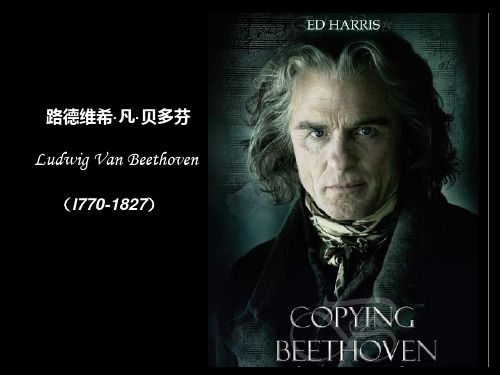
路德维希·凡·贝多芬Ludwig Van Beethoven Because of the fond of music and strong will, Even in his deafness period, created the most important representatives in his life --Symphony No.9 in d minor
路德维希·凡·贝多芬Ludwig Van Beethoven
close our eyes hold our breath listen carefully to the Fate Symphony
(命运交响曲)
Moonlight Sonata
(月光奏鸣曲)
路德维希·凡·贝多芬Ludwig Van Beethoven
Symphonie No.1 Op.21
(第一交响曲 1794--1796 C大调 )
Symphonie No.2 Op.36
(第二交响曲1801-1802.10 D大调 )
Symphony No.3 Eroica
(第三交响曲1803-1804 降E大调 )
பைடு நூலகம்
DSyumrpinhogntihe eNloi.f4eOtipm.6e0of the Beeth(o第v四en交, 响he曲h1a8d06c.r1e0a降teBd大调)
路德维希·凡·贝多芬
Ludwig Van Beethoven
(l770-1827)
Music is the trip of the soul ,
音乐是心灵的旅程 , There’s nothing more pure than music.
贝多芬简介英文演讲PPT
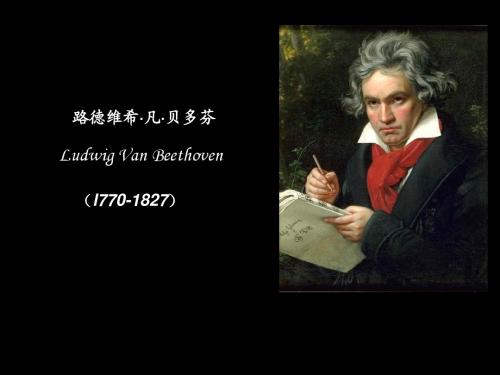
路德维希· 凡· 贝多芬Ludwig Van Beethoven
谢 谢
At the age of five,Beethoven began to play the piano
When he was eight years old , he gave his first public piano performance And began to compose at the age of ten
Have had twenty famous works by the age of twenty-five 。。。。。。
路德维希· 凡· 贝多芬Ludwig Van Beethoven
Life has ups and downs。。。
He began to have ear problems when he was 26 years old . After twenty years ( 1817 ) ,he became a
路德维希· 凡· 贝多芬
Ludwig Van Beethoven
(l770-1827)
路德维希· 凡· 贝多芬Ludwig Van Beethoven
He was born in the German town of Bonn on the 16th of December 1770.
路德维希· 凡· 贝多芬Ludwig Van Beethoven
(第九交响曲)
路德维希· 凡· 贝多芬LuLeabharlann wig Van Beethoven
Beethoven was considered to be one of the greatest musicians in the world. His persistence in art also have touched and inspired thousands of people 。。。
贝多芬英文简介

Beethoven
1770-1827
Beethoven is a musical genius suffering cast of joy. His life was constantly tormented by all kinds of suffering. His musical achievements unprecedented, but the poor life.
音乐是心灵的旅程,没有什么比音乐更加纯 净
Beethoven’s simple introduction
He was born in the German on the 16th of December 1770, a civilian family , have been followed his father to learn music .When he was eight years old ,he gave his first public piano performance. 1792 to Vienna for further study in art progress. He began to lose his hearing in 1801 and was deaf by 1819.
Famous words
I want to clutch the throat of destiny, it does not make me complete submission.
我要扼住命运的咽喉,它不能使我完全屈服
Music is the trip of the soul ,there’s nothing more pure than music.
贝多芬英文版介绍

Beethoven Ludwig van,German composer. The greatest composer of his day, he began to lose his hearing in 1801 and was deaf by 1819. His music, which formed a transition from classical to romantic composition, includes 9 symphonies, 5 piano concertos, a violin concerto, 32 piano sonatas, several other sonatas, 2 Masses, and an opera.
Chinese name:路德维 希· 凡· 贝多芬 English name:Ludwig van Beethoven nationality:德国 Born:波恩 Date:公元1770年12月16 日-1827年3月26日
Born in Bonn ,German,he moved to Vienna,Austria in his early twenties,and settled there,studying with Joseph Haydn and quickly gaining a reputation as a virtuoso pianist
Beethoven was so angry and sad over his deafness that he thought of killing himself.He even wrotea suicide note to his brother explaining why he was going to kill himself.Thankfully ,he did not go through with it.He would learn to copy with his obstruct and would go on to write some of the word’s greatest music.To hear sounds,Beethoven cut off the legs of his piano and placed the instrument on the floor.He did this to feel the vibrations(震动) in the floor when he played.
贝多芬简介英文演讲PPT
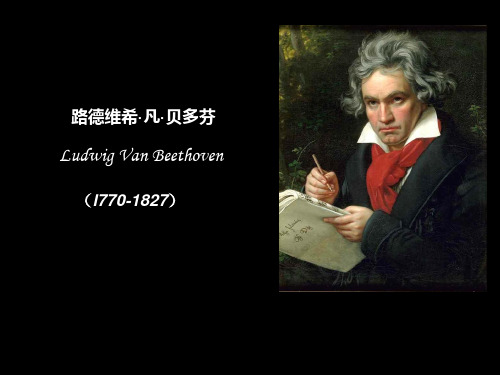
A beautiful story
• One autumn, Beethoven went to inspect, to a small town in the Rhine.One night in the quiet road walking, heard on and off the piano from the house, this is his song, which is a 16-year-old girl, her face is very handsome, but blind, Beethoven was impressed by the girl, decided toa play for her, that is the famous "Clair de Lune".
—
Mozart
莫扎特
路德维希·凡·贝多芬Ludwig Van Beethoven
路德维希·凡·贝多芬Ludwig Van Beethoven
five, At the age of five,Beethoven began to play the piano When he was eight years old , he gave his first public piano performance And began to compose at the age of ten Have had twenty famous works twentyby the age of twenty-five 。。。。。。
(第九交响曲 第九交响曲1824.2 D小调 小调) 第九交响曲 小调 第一钢琴协奏曲 1796 C大调 大调 第二钢琴协奏曲 1794-1795 降B大调 大调 第三钢琴协奏曲 1800 C小调 小调 第四钢琴协奏曲 1805-1806 G大调 大调 第五钢琴协奏曲降E大调 第五钢琴协奏曲降 大调 第六钢琴协奏曲 1807 序曲 艾格蒙特 序曲 科里奥兰 1807 C大调 大调 普罗米修斯的生民 1800-1801
介绍贝多芬作文英语
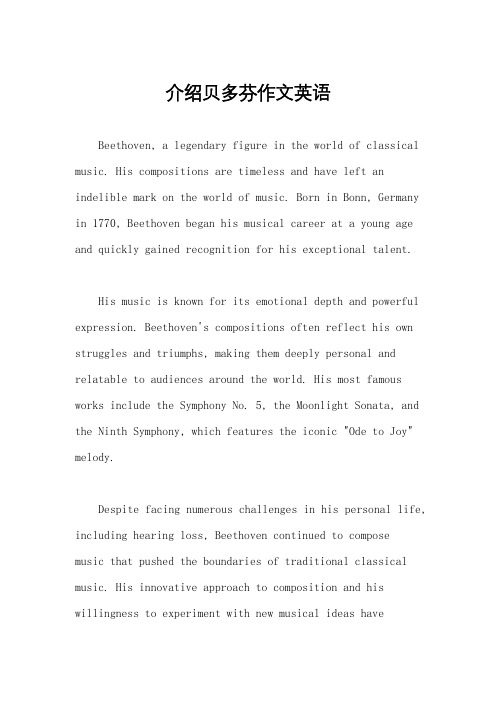
介绍贝多芬作文英语Beethoven, a legendary figure in the world of classical music. His compositions are timeless and have left an indelible mark on the world of music. Born in Bonn, Germany in 1770, Beethoven began his musical career at a young age and quickly gained recognition for his exceptional talent.His music is known for its emotional depth and powerful expression. Beethoven's compositions often reflect his own struggles and triumphs, making them deeply personal and relatable to audiences around the world. His most famous works include the Symphony No. 5, the Moonlight Sonata, and the Ninth Symphony, which features the iconic "Ode to Joy" melody.Despite facing numerous challenges in his personal life, including hearing loss, Beethoven continued to composemusic that pushed the boundaries of traditional classical music. His innovative approach to composition and his willingness to experiment with new musical ideas havecemented his legacy as one of the greatest composers of all time.In addition to his musical contributions, Beethoven's impact on the world of music also extends to his role as a teacher and mentor to other aspiring musicians. He was known for his passionate dedication to his craft and his willingness to share his knowledge with others, leaving a lasting influence on generations of musicians to come.Beethoven's music continues to be celebrated and performed around the world, captivating audiences with its timeless beauty and emotional power. His legacy lives on, inspiring musicians and music lovers alike to this day.。
介绍贝多芬的英语文章

介绍贝多芬的英语文章
【原创版】
目录
1.贝多芬的简介
2.贝多芬的音乐成就
3.贝多芬的作品特点
4.贝多芬对后世的影响
5.结论
正文
路德维希·凡·贝多芬(Ludwig van Beethoven)是一位德国作曲家,被广泛认为是世界音乐史上最伟大的作曲家之一。
他出生于一个音乐世家,从小就展现出了极高的音乐天赋。
在父亲的培养下,贝多芬四岁开始学习钢琴,七岁开始学习作曲。
贝多芬的音乐成就举世瞩目,他创作的九部交响曲都堪称经典之作。
其中,第三交响曲《英雄》和第五交响曲《命运》尤为著名。
贝多芬的钢琴奏鸣曲也颇具影响力,如《月光奏鸣曲》等。
此外,他还创作了一部歌剧《费德里奥》。
贝多芬的作品具有明显的个性特点,他的音乐风格独特,富有激情和力量。
他擅长运用大胆的和声和旋律,以及突破常规的节奏和形式,将古典音乐推向了一个新的高度。
贝多芬对后世的影响深远。
他的音乐作品不仅在当时备受欢迎,而且在今天的音乐界依然有着极高的地位。
他的创新精神和对音乐的执着追求,为后世音乐家的创作提供了启示和动力。
总之,贝多芬是一位伟大的作曲家,他的音乐作品为世界音乐史留下了浓墨重彩的一笔。
贝多芬英文简介PPT课件

(月光奏鸣曲)
Symphonie No.1 Op.21
(第一交响曲 1794--1796 C大调 )
Symphonie No.2 Op.36
(第二交响曲1801-1802.10 D大调 )
Symphony No.3 Eroica
(第三交响曲1803-1804 降E大调 )
Symphonie No.4 Op.60
(第九交响曲)
.
6
路德维希·凡·贝多芬Ludwig Van Beethoven
close our eyes (not sleep Zz。。)
hold our breath
listen carefully
to the second chapter of Symphony No.9 (第九交
响曲的第2章 )
(第四交响曲 1806.10 降B大调)
Symphony No.5 Fate
(第五交响曲1804-1808 C小调 )
Symphony No.6 Pastoral
(第六交响曲1807---1808 F大调 )
Symph.2 D小调)
Pinao Concertos No.1 Op.15
.
8
❖ 过了许多日子,贝多芬的气愤才渐渐的平息,并允许把这 部作品公之于世。1804年12月,这部交响曲在维也纳罗 布科维兹亲王的宫廷里首次演出。1805年4月在维也纳剧 院的第一次公开演出,是由贝多芬亲自指挥的,节目单上 写着:“一部新的大交响曲,升D大调,路德维希•凡•贝 多芬先生作,献给罗布科维兹亲王殿下。”奇怪的是,贝 多芬不说是降E大调,而说是升D大调。1806年10月总谱 出版时,标题页上印着:英雄交响曲为纪念一位伟人而作 从此,《第三交响曲》就被称为“英雄交响曲”。
关于贝多芬的英文简介
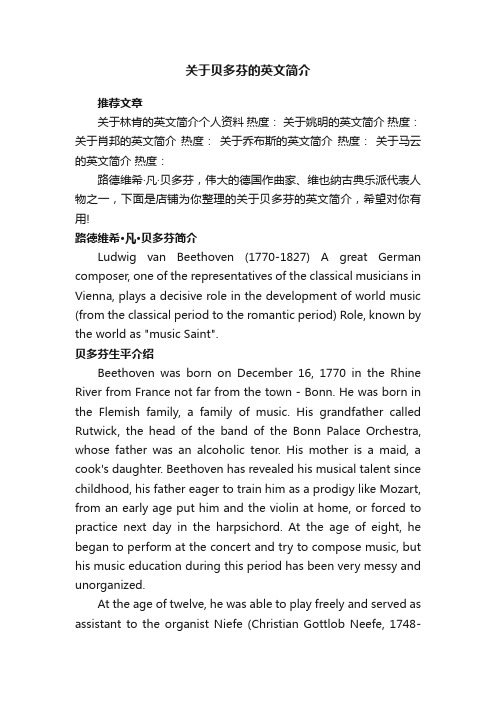
关于贝多芬的英文简介推荐文章关于林肯的英文简介个人资料热度:关于姚明的英文简介热度:关于肖邦的英文简介热度:关于乔布斯的英文简介热度:关于马云的英文简介热度:路德维希·凡·贝多芬,伟大的德国作曲家、维也纳古典乐派代表人物之一,下面是店铺为你整理的关于贝多芬的英文简介,希望对你有用!路德维希·凡·贝多芬简介Ludwig van Beethoven (1770-1827) A great German composer, one of the representatives of the classical musicians in Vienna, plays a decisive role in the development of world music (from the classical period to the romantic period) Role, known by the world as "music Saint".贝多芬生平介绍Beethoven was born on December 16, 1770 in the Rhine River from France not far from the town - Bonn. He was born in the Flemish family, a family of music. His grandfather called Rutwick, the head of the band of the Bonn Palace Orchestra, whose father was an alcoholic tenor. His mother is a maid, a cook's daughter. Beethoven has revealed his musical talent since childhood, his father eager to train him as a prodigy like Mozart, from an early age put him and the violin at home, or forced to practice next day in the harpsichord. At the age of eight, he began to perform at the concert and try to compose music, but his music education during this period has been very messy and unorganized.At the age of twelve, he was able to play freely and served as assistant to the organist Niefe (Christian Gottlob Neefe, 1748-1798). At that time he began to learn music with Nie Fei. Nie Fei is a multi-faceted musician, he expanded Beethoven's artistic vision, so that Beethoven familiar with the German classical art of some excellent examples, and to consolidate Beethoven's understanding of the purpose of lofty. Beethoven's formal learning and systematic upbringing, in fact, began with the intensive teaching and training of Nie Fei: Nie Fei also led him to teach Mozart in Vienna in 1787. Mozart after listening to his performance, it is predicted that one day Beethoven will shake the whole world. Beethoven arrived in Vienna shortly after the death of his mother, he had to immediately back to Bonn. As a result of the family's drag, until the fall of 1792 his father died, he came to Vienna for the second time, but then Mozart is no longer alive. Beethoven came to Vienna for the second time and quickly won the title of the most outstanding performer in Vienna (especially improvisation). Later, he studied with Joseph Haydn (1732-1809), and later with Schenck, Johann Albrechtsberger (1736-1809) and Antonio Salieri (Antonio Salieri , 1750-1825) and others to learn. He was in Bonn through contacts with the intellectuals of Browning, access to many well-known professors, writers and musicians, and from them, by the "hurricane" trend of influence. His democratic ideology was mature in the years before the French Revolution, but grew rapidly in the revolutionary era. Known as the music giant.The ideology of the French bourgeois revolution in 1789 gave him a lot of inspiration, thus laying his world of humanism. Convinced that human equality, the pursuit of justice and freedom of personality, hate feudal autocratic oppression. Although the three classical composers of Vienna in the life of the famous composer is quite close, but Beethoven's ideas withHaydn and Mozart is clearly not the same "era." Haydn was insulted, but he was occasionally irritated, but always submissive, when the progressive literary trends and revolutionary emotions are rarely make him excited, his music and the struggle is always insulated. Mozart's spirit is not less than Haydn, he is brave to resist, prefer poverty and can not tolerate the insult of the archbishop, but in his music, from that full of sunshine and youthful joy behind, often can still feel a trace Pain, depression and sadness. Only Beethoven, he is not only angry against the feudal system of autocracy, and with his music called for people to fight for freedom and happiness. Beethoven's creation in the Bonn period (1782-1792), mostly small piano pieces, ensemble and song, etc., this period can be said that he is only in the creative preparation phase. In his first decade of the creation of Vienna (1792-1802), the most famous works are "Sorrowful", "Moonlight" piano sonata and "Crowe" violin sonatas and the third piano concerto. But during this period, he has a further understanding of social and political issues, but also aware of his efforts to explore the goal. 1802 - 1812, his creation into the mature period, this time later became his "heroic age."The mature process of Beethoven's creative activity appears to be rather slow, but it is actually very solid. When he was thirty when he began to write the first symphony, and in such a age of Mozart has written about forty symphonies.Beethoven's life is very bumpy, and he was deaf in his later years; he began to feel awakened from the age of 26 in 1796, but until 1801, when he was sure that his ear was unable to heal, he told him this matter friend. But his love of art and love for life overcame his personal suffering and despair - suffering became the source of his creative power. In such a spiritual crisis to thepeak of the time, Beethoven with strong will to overcome the difficulties he began to create his optimism of the third "hero" symphony. "Hero" symphony marks the spirit of Beethoven's turn for the better, but also marks the creation of his "heroic age" of the beginning.Beethoven's later stage in Vienna, because of Europe is experiencing a serious political reactionary period, that Metternich's reactionary rule is particularly rampant period, his creation is also showing a temporary decline (1813-1817). From 1818 onwards, in the last ten years of Beethoven's life (1818-1827), he was created with giant perseverance in the case of deafness in his ears, deterioration of health and poverty and spiritual torture, Ninth "Chorus" Symphony ", summed up his glorious, epic life and show the good wishes of mankind.Beethoven died in Vienna on March 26, 1827. He did not have a loved one beside him, but at the time of the burial on the same month he formed a wave of mass. All the schools were suspended for mourning and twenty thousand The mass escorted his coffin, and his tombstone was engraved with the inscription of the Austrian poet Grayl Patch (1791-1872): "When you stand in front of his coffin, Mourning, but a lofty affection; we only have such a talent for him to say: he has done a great cause ...Beethoven is one of the great composers in the history of world art. His creation embodies his giants' character, reflecting the progressive thoughts of that era. His revolutionary heroic image can be used "through suffering - to joy; Through the struggle - to win "to be summarized. His works are both magnificent and very simple and clear, his music content is rich, but also easy for the audience to understand and accept.Beethoven's music embodies the pain and joy of the people of that era, the struggle and the victory, so it has always inspired people, encouraged people's morale, even now makes people feel kind and encouraged.Beethoven's "Symphony No.9", "Fifth Symphony of Destiny", "Symphony of the Sixth Pastoral", "Third, Fourth, Fifth Piano Concerto", "Moonlight", "Sorrowful Piano Sonata "," solemn mass "," fate "and so on, these are rid of classicalism, show freedom, passionate and beautiful movement.Therefore, Beethoven vowed never to give up the music Beethoven's career Beethoven's growth era, it was Joseph II's "enlightened autocratic" period, the Bonn rulers also implemented some improvement measures. Bonn became one of the centers of the German Enlightenment.Beethoven was born and began his struggle with fate. His father would like to open up his musical talent, always regarded him as a child prodigy everywhere to show off. At the age of four, the father let him sit in the piano all day (the piano is a form and organization similar to the instrument of the piano, before the piano appeared in a keyboard instrument), or put him and a violin Together in a room. His father always forced him to learn with violence. At the age of eleven, Beethoven joined the theater band. At the age of thirteen, he became a great organist. He was not sorry for music, it was very lucky.From 1781 onwards, Beethoven at work in the theater at the same time, with the band command Naifu learn Bach's "average law piano" and composing method. Nefer is a composer who is very cultivated and tends to be an enlightened conductor, and he has contributed to the development of German national opera and opera. Beethoven, by learning from the teacher, recognizedthe importance of studying the German national music tradition and under the guidance of the Nuffai also accepted the influence of the Enlightenment, the German progressive literature had a keen interest.Beethoven as a pianist has the skill to all people have left a deep impression. He is not only a successful performer, but also a good teacher. He soon became a prolific composer. His works are popular and twenty-five or six years old can be easily sold to publishers.Beethoven had a harbinger of deafness near the beginning of the year, and the young composer was uneasy about the ominous omen, which was conceivable. For a time he thought of suicide. Beethoven kept writing a lot of music. But with the passage of time, he was the music audience loved music attention is diminishing. But he is constantly successful. Beethoven was almost deaf when he was 50 years old. The results he no longer on stage performances, and even become more lonely quirks. He is not as productive as he used to be, and the work gives a sense of torture. At that time he was mainly for himself and some ideal future audience and composer. It is said that he had told a critic that his work "was not created for you but for the future generation."If the most talented composer of the time and space is full of deafness, it is better to say that it is one of the most ruthless mockery of fate; if Beethoven, despite the pain of deafness, continue with a superhuman perseverance To ensure the quality of the work, then this is an inspiring, almost incredible achievements. But the fact is more unexpected than imagined: in fact Beethoven in the complete deaf years, the music to write out of his early works of the standard. Most people think that hiswork in his later years is the greatest masterpiece of his life. He died in Vienna in 1827, 57 years old.Beethoven created a large number of works, including nine symphonies, 32 piano sonatas, five piano concerto, ten piano violin sonata, a series of string quartet, sound music, opera, and many other music. But compared with the number of his many songs, more importantly, its quality. His work to the perfect imagination and unrestrained feelings organically integrated. Beethoven uses his own playing to keep people's chord, and they never think that instrumental music is a secondary art.Beethoven is a rather creative composer, and many of the changes he has brought to the music have produced the effect of immortality. He expanded the size of the orchestra, increased the length of the symphony, and expanded their fields. He proved that the piano has a very wide range of uses, making it a first-class instrument to make a contribution. Beethoven represents the transition from classical to romantic. His work brings inspiration to many romantic songs.Beethoven has a great influence on many of the later composers, including various styles of people such as Brahms, Wagner, Schubert and Chukovsky. He also opened the way for many people, such as Berlioz, Gustav Mahler, Strauss and so on.Although John Sebastian Bach is almost famous with him, but Beethoven's music than Bach's music has a wider range, the number of more listeners, and Beethoven made many innovations than Bach's works on Later music development has a more profound impact.Beethoven's symphony works more by the use of extended sonata form, his creative ideas broad, magnificent, deep thinking, image contrast, rich and varied, in the processing of the songhave reached the overall unity of the work in the creation of the In the original symphony in the third movement of the small step dance into a scherzo, the opera in the world of contradictions and conflicts through the struggle to win the dramatic performance techniques applied to the symphony, in the ninth symphony even joined the chorus , Expanded the performance of the symphony and the atmosphere. In addition, in the creation of the symphony, Beethoven made bold innovation in the staircase, to establish the status of the clarinet in the band, in the ninth symphony in the use of four trombone, etc., formed a novel style, A new field, with this innovative form of music to fully express his inner world, reflecting the progress of society at that time, the European classical music to the development of the highest peak, creating a 19th century European romantic music Precedent.But Beethoven's last years were the most tragic and painful years of his life, and the threat of loneliness and poverty made him troubled and alone, and died in Vienna on 26 March 1827. It is said that in his dying moment, the storm thunder and lightning, Beethoven raised his dry arm to the sky for the final blow. This life is endless fighting spirit, all focused on his immortal masterpiece.Beethoven is one of the greatest creators of human art. On the one hand, he has a remarkable musical talent, hot rebellious temperament and giant strong character; the other hand, his indomitable will and the sense of responsibility of society and the noble ideas, the formation of his special quality as a musician. Through his own creation, especially in his nine symphonies, he reflected the great movement of the people and the most progressive thought of that era. He wrote a series of symphonicworks by profound philosophical and touching artistic images of the times and the fate of the individual, showing the rise from struggle to victory, from darkness to light, from suffering to happiness to the bourgeoisie Period of the spiritual process, his nine symphonies like pearls always glittering.Beethoven has the spirit of rebellion and freedom of advocacy. In 1807, Beethoven lived in the Duke of Liqinovsky, Vienna. One day, the Duke's family came to a large number of guests, they were at that time Napoleon stationed in Vienna, the French officer. The Duke wanted to invite the guests to listen to music and send someone to Beethoven, but did not explain the situation to Beethoven. Beethoven is unknown, with his new written "warm" sonata happily came. Into the living room to see, was actually a bunch of occupation forces, Beethoven immediately refused the request of the Duke, the Duke angry, even the plate from the face of Beethoven played the order, Beethoven for Li Xunovsky's shameless sellers Act angrily to the extreme, he ignores the torrential rain in the night to pick up the score and leave, and the Duke to send him a statue before the fall of a crushed.The next day the Duke received a letter from the duke, and the status of the duke was born with the occasional birth, and the reason why I became Beethoven was all about me. The Duke now has plenty, and the future is Beethoven is always only one! "Perhaps the actual situation than the information contained in the more violent, but Beethoven's friends try to cover up the past. In the Wegler database, "Wegler and Brewer's family friend Beethoven" had a letter from Reese to Weigler on December 28, 1837, saying, "If there is no Earl of Oppsdorf and others present , Be afraid that the fighting will inevitably occur, Beethoven hasraised a chair ready to Ricky Novsky Prince of the head of the blow, because Beethoven hiding in the room tied to the door, the prince opened the door but fortunately Opusdorf Between the two of them. "The cause of the quarrel was that Beethoven refused Ricky Novsky to play for several French officers who called him a dinner party.Through the analysis and analysis of nine symphonies in Beethoven, especially the analysis of the four (ie, the third, fifth, six, nine) thematic symphonies, we can not only understand the basic picture of Beethoven's creation That great and pure thought, but also can understand the major innovations in symphony creation, you can see how the symphony from Haydn, Mozart era transition to Schubert, Mendelssohn as the representative of the new development period.As early as Beethoven was born he was recognized as a world-renowned musician, he is a great classical composer, but also a pioneer of romantic sent to history. In 1827, when Beethoven died, many of my friends and admirers came to offer condolences.Beethoven was buried in the Waehringer Friedhof. The literary master, Greer Pazzo, once said in the eulogy that "Beethoven gave all of his talents to the crowd, and there was nothing from them, and he was far from the crowd." The Beethoven, 1828 was also buried here, accompanied by him. In order to commemorate Schubert's young genius musician, in the Wei Lingge cemetery next to the construction of a Schubert garden (Schubertpark). Today, the Schubert Garden on the Weilinger Street is where many tourists hang around.。
